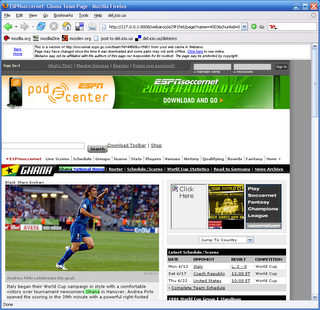In this previous post, I mentioned that one of the ways to handle the connectivity problem of a tropical region is to cache data locally and sync with a central server when a connection is available. Well, guess what ?
A company called Webaroo has done just that. Webaroo recently released a free beta of their web unplugged service. This service allows users to search and browse portions of the web anytime, anywhere and unconnected. It accomplishes this by crawling the web, analyzing the pages and creating topic specific web packs for download. The downloads are stored locally on a users computer and served via the Webaroo server/client over local http. In addition it allows a user to cache and index specific websites for offline browsing. The locally stored data is updated when the user goes online.
The Webaroo server/client is a free download with the following system requirement:
Laptop/Desktop System Requirements

For those of us who are unable to meet the system requirements, a poor mans version can be implemented using a browser. Most browsers allow a user to save specific web pages for offline browsing. A more challenging method, would be to write/modify a Firefox extension to provide similar functionality.
Laptop/Desktop System Requirements
- Windows XP SP1+ or Windows 2000 SP4
- 1 GHz+ Pentium class processor or equivalent
- 500 MB RAM (Recommended 1GB for larger Web Packs)
- Internet Explorer 6.0+ or Mozilla Firefox 1.5+
- Microsoft .Net 1.1 (Downloaded during installation if required)
- Broadband Internet connection while downloading and updating content

For those of us who are unable to meet the system requirements, a poor mans version can be implemented using a browser. Most browsers allow a user to save specific web pages for offline browsing. A more challenging method, would be to write/modify a Firefox extension to provide similar functionality.
Alternatively, the combination of web feeds and news aggregators present interesting tropically tolerant ways to access web content. I will cover this in a later post.
There is an argument to be made that instead of developing technologies to cache and serve data we should focus on expanding broadband availability. My response would be, there is nothing wrong with a multi-tiered approach or a stopgap solution.
In a world where internet connectivity is intermittent, cache-and-browse is the way to go.
 Technorati Tags:
Technorati Tags: 
5 comments:
i suppose wireless is out of the question in htat tropical region :)
Actually, wireless is very viable and might actually be the saving grace. Its a topic I will cover one of these days.
I completely agree with the end of your post: nothing wrong with a multi-tiered approach to a problem!
I continue however, to be irritated by some of the issues around broadband availability. In areas where for lack of physical infrastructure there is no availability there is less to be said, but what about when organisational policies keep braodband inaccessible. You probably know I'm referring to SAT 3, with Ghana as an example. For no apparent reason ( because I don't see the logic in previous reasons given), the pricing is prohibitive. There is phenomenal ( in comparison to alternatives) acces available, but because a government monopoly has control and will not price competitively, the majority of people are stuck on dial-up connections..
I'll stop so I don't blog on your blog, but it is somewhat frustrating...
That being said though, even with de-regulation, extremely rural areas are not likely to have broadband access for a while, so I can see how cached browsing would be a solution there..
houstonmacbro,
People in the tropical region don't read news online. There are cheaper options.
With respect to individual pages - one can use the browser caching option.
Nice posts charle-- lots of food for thought. I was wondering however, if my mother read this particular post (she'd definitly be interested in caching and browsing), how would she even know how to begin caching? It might be helpful to include an update with links to some instructions.
Post a Comment